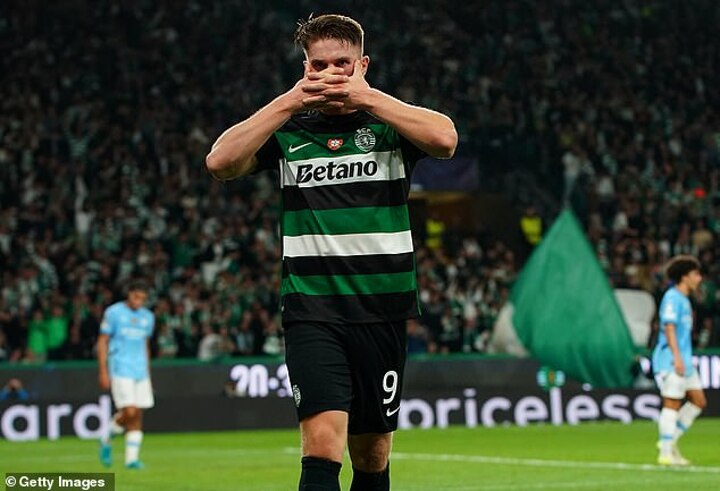The overlapping hands-on-face celebration combined with goals from different directions for Sporting Lisbon will have been enough to cloud the minds of Arsenal's match analysts.
Similar to the effect felt by defenders who have tried and often failed to contain Viktor Gyokeres, arguably Europe's hottest asset.
As for Mikel Arteta, there is one specific flaw in his team that has yet to be addressed so far: playing away from home in Europe.
Over their four away games in the Champions League in 2024, the Gunners' total is three defeats and one draw.
For Gyokeres, this calendar year has produced 59 goals in 55 appearances for club and country, making the striker eligible for a move to the Premier League very soon; Manchester United, Arsenal and Chelsea are all linked.
The goals and performances have put the 26-year-old in the spotlight and after scoring a hat-trick against Manchester City at the Estadio Jose Alvalade on November 5, he now faces a crucial clash against centre-backs William Saliba and Gabriel. .
It's a duel, but to understand how he learned to navigate defenses you have to go all the way back to his formative years in Sweden under the tutelage of father Stefan.
The Stockholm-born striker joined IFK Aspudden-Tellus in 2004. Club chairman Bjorn Thuresson remembers a child who knew from the start that he wanted to be a footballer.
“It was very, very clear that this man wanted to be a footballer from the age of seven,” he tells Mail Sport.
'He was great, super focused and dedicated. I haven't heard anyone talk to him about anything other than football!
'Some aspects of his game were evident even in his early years: he always wanted to score a goal, always take the shortest route to the goal.'
The club had three different teams in the same age group to cater for all levels: beginners, intermediate and advanced. Gyokeres often played for all three teams in the same week so he could be on the field.
He says: 'In the more competitive teams he could of course play a more regular role, but in these other, more mature teams or situations he had to take on different roles.
'When the competition was less good at the other end, he took on other roles instead of just scoring goals. Because he could have scored ten goals in those games, but that wouldn't have benefited anyone.
'So then he could play a role that was more about delivering balls to others, trying to control the rhythm from further back. And he sometimes also worked as a defender and as a winger.'
It is this foundation that taught Gyokeres how to play as a striker against defenses. He understands the psyche of opposition defenders and how they are likely to react.
Thuresson says: 'That (playing different roles) is something that Stefan, his father, said is good for him when it comes to a pedagogical setting.
'In the earlier, more formative years, being able to play in many different positions and take on very different responsibilities is something that teaches you a lot.'
Stefan, who coached the 1998-born year group for IFK Aspudden-Tellus, had mapped out his son's path. That included rejecting the academies of renowned clubs in the city – a path followed by the majority of European talent.
Gyokeres is different in this way: he waits until the age of 14 before signing with IF Brommapojkarna.
“Stefan convinced Victor to stay with us a little longer because with the opportunities we have they can play as much football as they want,” he added.
'You can play as many practice matches as you want. He let him stay on for another two years or something.
'When you go to an academy very early, you are usually assigned a role, and then you develop that role in depth, but you are rarely torn between the different parts.'
Ex-centre defender Uwe Hunemeier was at Brighton when Gyokeres joined the club in January 2018. The forward never made a senior appearance for the Seagulls and, after loan spells at German second division club St Pauli and Championship sides Coventry and Swansea, he was sold to Coventry on a permanent basis.
It was a move that clearly hadn't worked at all. Hunemeier, who is now assistant coach at SC Paderborn 07 in Bundesliga 2, played against Erling Haaland and Robert Lewandowski. He can see those comparisons because he has played and trained with him.
How are Saliba and Gabriel supposed to stop him?
'I played against Lewandowski and Haaland. You have to stop these players very quickly because they have physical strength in their game and they are very fast (in the mind),” he told Mail Sport.
'When an attacker (like Gyokeres) has confidence, it is so difficult for a defender to trouble you. You have to be on his foot most of the time, but you have to be alert every second of the game, because he is strong with his head, strong with his left foot, on his right foot, reading the game, going in the back, the game to prevent.
'You also have to be at his back to stop these types of players. They want to cut into your back so you can't see them. That makes it so difficult with a good striker. They always find a way to get some space.
'He is strong, but not as strong as Haaland or Lewandowski because he is not as big as those players. You have to be tight, push him in duels to get him off the ball. But from what I've seen in recent months, he can score any goal.
'I'd say most quick attackers have a good sense of what's coming, but he probably realizes the situation before most centre-backs.'
No matter how Saliba and Gabriel try to thwart him, Gyokeres will certainly have to stop for a while.
